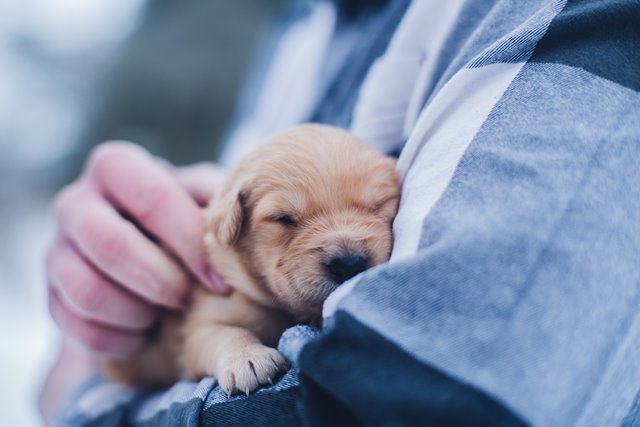Separation Anxiety in COVID Puppies
January 29, 2021
COVID-19 took the world by storm creating a vast whirlwind of effects that are slowly being uncovered every day. From the crippling effects of the economy to the havoc wrecked on the education system, a very much forgotten effect of the virus is the behavioral habits developed by our furry friends. Ever since the world shut down in March 2020 and our companions got used to our presence at all hours of the day, they find it difficult to return to daily routines without their owner. These behaviors specifically can be very harmful to younger puppies, especially ones purchased amid the pandemic for they have known no other way of life than the one where their humans are in their presence for every moment of it. As stated in The Observer, “Adoption rates have skyrocketed,” says Animal Shelter Administrator Mindy Naticchioni from Cuyahoga County Animal Shelter. “Dogs are being adopted quickly and all the dogs we sent into temporary foster homes (about 70) when we closed in March were adopted.” Although this influx of critters finding forever homes is heartwarming, it is important for dog owners to understand how devastating separation anxiety can be on an animal’s health and to take action to prevent these traits from developing before it is too late.
As the world starts to reopen, it is critical for dogs to feel comfortable spending time alone in their homes, for we cannot spend all waking hours of the day catering to our furry friends, even as much as we would like to. Being extremely social creatures, dogs find socializing at a young age to be critical for these puppy stages pave the development of habit in our pets. When an owner begins to return to work, disappearing for hours during the day, dogs might perceive these actions as neglectful and depressing, for dog’s brains cannot understand our daily lives. They perceive these acts of abandonment to be displays of hate, and these feelings can lead to a variety of harmful behaviors. After all, dogs have feelings too. According to the American Kennel Club, such behaviors to look out for when deciding if your dog has separation anxiety are “aggression, urinating or defecating in the house, drooling, panting, destructive behavior, depression, excessive barking, pacing, restlessness, and/or repetitive or compulsive behaviors.” Our dogs, old or young can develop these traits as a form of attention-seeking, but regardless of the extent of the visible traits, we sense the emotional stress put on our dogs is catastrophic.
It is estimated that approximately twenty-forty percent of dogs have developed separation anxiety since the start of 2020, which one can easily assume is a result of the coronavirus quarantine efforts (Veterinary Practice News). Despite the intense influx of separation anxiety cases in our pets this past year, many practices can still be enacted that have the potential to break your pet of these negative habits. Such advice can include leaving your pet in a crate for an hour at a time per day, which would ensure that they would develop proper isolation skills. It would ensure that the animal would feel comfortable being alone even when its owner is not present. The bottom line of the matter is that not all dogs develop the same sense of separation anxiety, for there are a variety of diagnoses that cause dogs to react in different ways. Vets can prescribe various medicines to pets that suffer from severe anxiety, so if you are truly worried about a pet’s well-being help is available. Otherwise, in the future of our virtual world when adopting new puppies it is crucial to properly socialize puppies and accustomed them to spending time alone to avoid separation anxieties from the start.
Works Cited
Jackson, Hannah. “Pet Adoption Rates Rise during COVID-19.” The Observer, 9 Oct. 2020,
observer.case.edu/pet-adoption-rates-rise-during-covid-19/.
Kriss, Randa. “Dog Anxiety: What Dog Owners Need to Know.” American Kennel Club,
American Kennel Club, 15 Jan. 2021, www.akc.org/expert-advice/health/dog-anxiety
“Pet Separation Anxiety as COVID-19 Stay Home Orders Lift.” Falls Village Vet Hospital, 18
May 2020, raleighncvet.com/general-health/separation-anxiety-covid-19-stay-home/.
Tynes, Valarie. “Separation Anxiety: Treating Dogs in the Wake of COVID-19.” Veterinary
Practice News, 19 Aug. 2020,
www.veterinarypracticenews.com/separation-anxiety-treating-dogs-in-the-wake-of-covid
